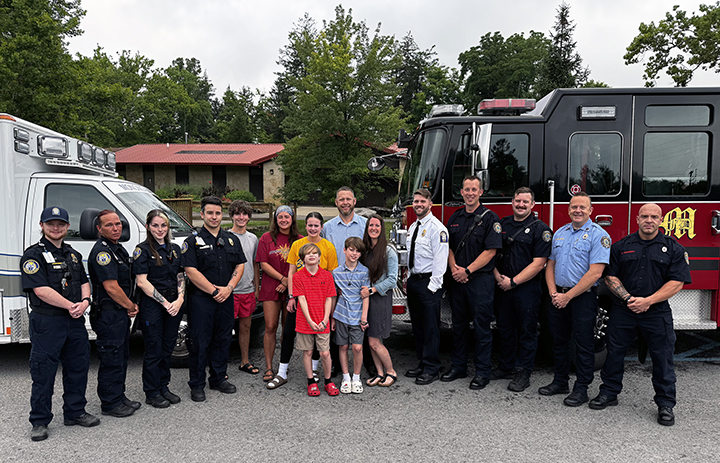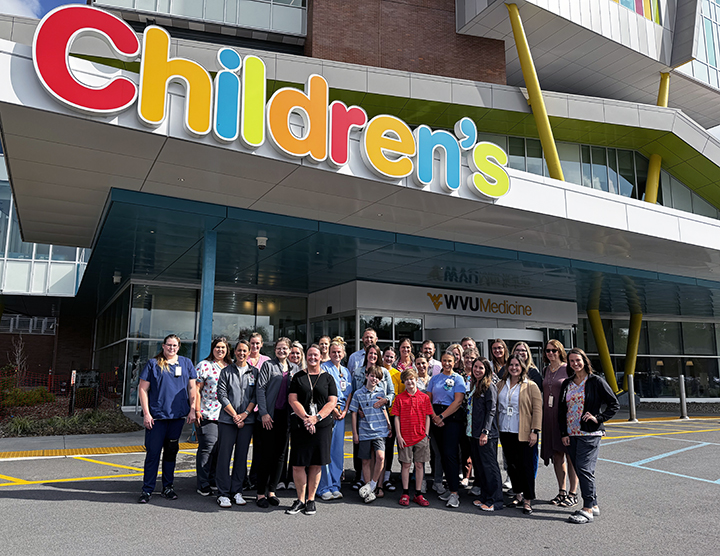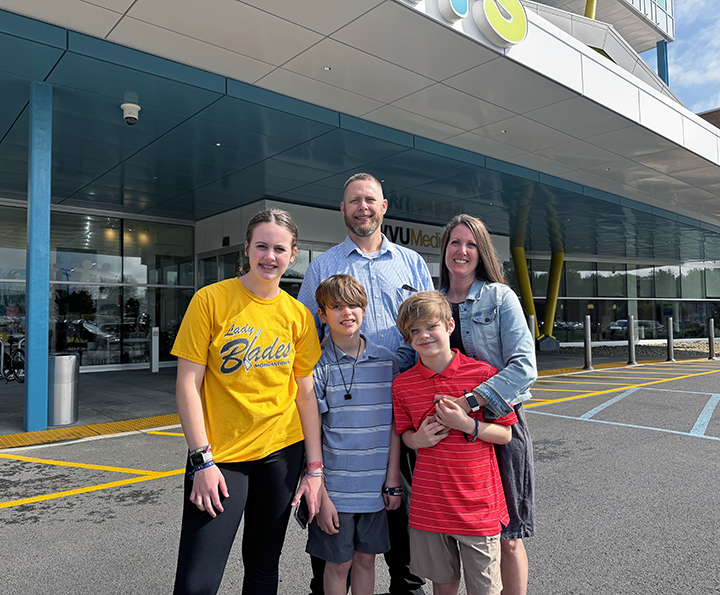Hope & Health
Articles and Updates from WVU Medicine Golisano Children's
07/3/2024 | Your Legacy Is....Our Kids
Miracle Moments: Jackson Pauley
Summer vacation means plenty of family swim time at local pools. For most kids, it’s business as usual – splashing, cannonballs, and the like, but when Elizabeth Pauley heard the three whistles from the pool’s lifeguards, she knew something wasn’t right. A boy was being pulled out of the pool. She instantly recognized his swim trunks. It was her son Jackson.
Jackson is like most other 11-year-old boys. He loves playing with friends, he’s heavily involved in hockey, and he argues with his siblings. However, one main difference is that Jackson was diagnosed with epilepsy about five years ago, when he was in kindergarten.
That Saturday at the pool, Elizabeth was chatting with her daughter when the incident happened and immediately rushed to where they had pulled Jackson out of the pool.
“I instantly thought he had a seizure, although he hadn’t had one in about two months,” she said. “It was so ironic because we had just talked earlier that morning about how he had not had a seizure in a while.”
Elizabeth grabbed Jackson’s seizure rescue medicine out of her pool bag and started running over to them screaming, “He has epilepsy! He has seizures!”
When Elizabeth got to him, she could tell he was in a state of seizure. It also appeared he wasn’t breathing; however, the lifeguards still administered his rescue medicine.
As luck would have it, there was an off-duty pediatric intensive care unit (ICU) nurse at the pool that day. She and pool’s lifeguards all began taking turns performing CPR on Jackson.
Elizabeth recalls how the Krepps Pool lifeguards expertly handled the crisis.
“They did everything right. I could tell they had been heavily trained. This isn’t something they do very often, if ever, so how they handled it was perfect. My husband, Jason, and I are so grateful they were able remember their training and put it into action so quickly,” she said.
“The coordination they showed from pulling Jackson out of the pool, performing CPR, getting him dried off to use the AED, and getting first responders on the scene all while controlling the crowd and giving the other lifeguards space to work was nothing short of amazing.”
It was at this point that first responders were on the scene.
“I felt they did an amazing job,” Elizabeth said. “They were so quick to respond, and they already had all the necessary information.”
As they loaded Jackson into the ambulance, Elizabeth frantically called and texted Jason.

Fortunately, Jackson’s ambulance ride to the WVU Medicine Jon Michael Moore Trauma Center at J.W. Ruby Memorial Hospital was literally only a minute or so away.
Elizabeth immediately followed the ambulance in her car, and, fortunately, a friend of hers, who was also at the pool, took Jackson’s older sister, Morgan, and his younger brother, Braxton, to the hospital a short time later.
“Every second driving over to the hospital felt like a lifetime because we didn’t know if they had gotten Jackson breathing again,” Elizabeth said. “When they took him out of the ambulance, he was still unresponsive, and they were giving him oxygen.”
Jason arrived soon thereafter, and the Pauleys were led to a waiting area. When the doctor came in a short time later to give them an update, it was like time stopped. Jackson had been placed on a ventilator as he was not breathing on his own yet. They were also taking him for a CT scan to rule out any sort of head trauma or brain injury.
While the scan revealed no head or brain injuries, Jackson stayed in the Trauma Center for two-to-three hours until he was stable enough to be transported over to the WVU Medicine Children’s Hospital Pediatric ICU.
“The folks at Ruby were awesome,” Jason said. “I think their professionalism was off the charts.”
As Jackson was being transported to the ICU, Elizabeth held his hand and asked him, “Jackson, can you hear me?” She felt Jackson squeeze her hand. It was then she knew he was “still in there somewhere” and could hear her. She wanted to make sure she wasn’t dreaming and asked the nurse, “Did he just squeeze my hand?” The nurse confirmed.
While in the ICU, Jackson’s care team needed to increase his sedatives, which, in this situation, was a very good sign as he was alert, aware, and uncomfortable with all the apparatuses he was hooked up to and the tubes that were placed in his throat.
It wasn’t until about two days later, on Monday, before Jackson would open his eyes and fully respond to prompts and questions. “That time, until then, was really scary,” Elizabeth said.
Jackson was still being ventilated when his care team began checking on his brain activity. While Jason and Elizabeth had a sense their son’s brain was working and was able to comprehend things, his care team needed to confirm.
That night, Jason and Elizabeth began to go from preparing for the absolute worst to knowing Jackson was going to live, but with all the sedation, wondering how he was going to be cognitively. Doctors said Jackson’s vitals looked good, but they were still pulling a lot of fluid from his lungs.
Sunday morning around 5 a.m., Jackson developed a fever and his oxygen decreased. Bacteria had formed in Jackson’s lungs. Later that morning, WVU Medicine respiratory therapists were extracting algae-green fluid.
The Infectious Diseases team tested and confirmed the bacteria was solely from the pool. So, with antibiotics being administered around the clock, Monday was a much better day, and Jackson quickly began recovering over the course of that week.
“All the nurses and doctors, neurologists, everyone, was super amazing, and very transparent. We asked a ton of questions, and everyone was just so nice. The staff were extremely caring. They spent a lot of time with us,” Jason said.
“I knew Jackson was in really, really good hands. Every single person from the bottom floor to the top floor that we eventually made it to was wonderful and very caring for Jackson. They kept telling me how much they were praying for him.”
Jackson was somewhat of a “celebrity” by the time he recovered enough to be moved to the ninth floor.
“The pediatrician there said, ‘We’ve been getting updates on Jackson. We’re just so glad he made it to our floor. We’ve been waiting for him to get here. We can’t wait to take care of him. We’ve been praying he would make it up here to this floor,’” Elizabeth said. “It just felt like they were all taking care of their own child.”
Jason and Elizabeth felt they received superior care every step of the way at WVU Medicine Children’s.
“What was so impressive was how attentive they were, from the doctors to the nurses to the respiratory therapists to the environmental services folks. They would come in ask if we needed anything, and it wasn’t just a ‘check-the-box ask.’ It was genuine,” Jason said.
“The Child Life team was also greatly appreciated as they were not only caring for Jackson, but for us, as his family, as well.”
The next steps in Jackson’s recovery are to continue monitoring his cognition through a neurologist as well as a behavioral medicine specialist and to get more information about his seizures.

When Jackson left the hospital, his pediatrician did not put any restrictions on him and allowed him to resume normal activities as he felt ready.
“We’ve had a few good weeks since it happened, and I know Jackson is feeling like himself again because on his first night home from the hospital, he wanted to ride his bike around the neighborhood,” Elizabeth said. “He also wanted to play in a hockey game the weekend after his hospital release.”
Neither Jason or Elizabeth recall Jackson ever having seizures prior to 6 or 7 p.m., which likely means Jackson’s seizures are evolving and entering uncharted territory. For that reason, Jackson will be seeing a pediatric neurologist very soon.
“The seizure at the pool was certainly out of the ordinary for him. I have been recording day’s events or things Jackson had been eating to find some sort of pattern. Sometimes terrible things like this are almost a blessing because now it’s pushing this forward faster than before,” Elizabeth said.
Jason was quick to add, “Even if the circumstances would have been different and ended negatively, we’d still be praising all these amazing people. Too often our responses are solely based on outcomes.”
For his part, Jackson doesn’t recall much from the ordeal.
“He kind of remembers going to the pool,” Elizabeth said. “Strangely enough, he can remember what shirt he was wearing though. I think that confirms to me that he had a seizure.”
There’s one key reason why Jason and Elizabeth feel like Jackson is back to his old self. “He’s arguing with his siblings again.”

